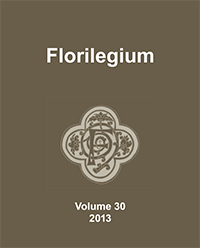Omnia disce: Hugh of St. Victor on History, the Arts, and Exegesis
Abstract
The twelfth-century theologian Hugh of St. Victor is generally credited with redefining history in its relationship to medieval biblical exegesis. He inspired exegetes to look beyond the text of Scripture at the historical realities behind it. This, in turn, led historiographers to take biblical exegesis more seriously as a source for historical knowledge. Hugh's thinking deeply influenced the practice of medieval exegesis (as attested by the works of Andrew of St. Victor and Peter Comestor) and, albeit to a somewhat lesser extent, the writing of history in the thirteenth century, in the work of historians such as Helinand of Froidmont and Vincent of Beauvais.
Published
2015-05-22
How to Cite
van Liere, F. (2015). Omnia disce: Hugh of St. Victor on History, the Arts, and Exegesis. Florilegium, 30, 191–210. Retrieved from https://journals.lib.unb.ca/index.php/flor/article/view/22879
Issue
Section
In Focus – Exegesis and the Arts



